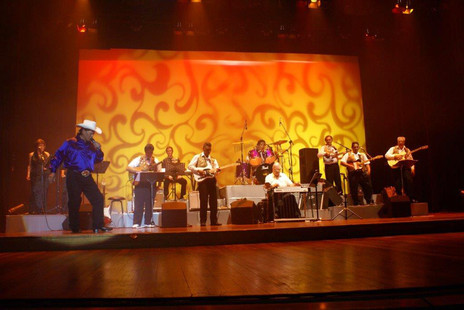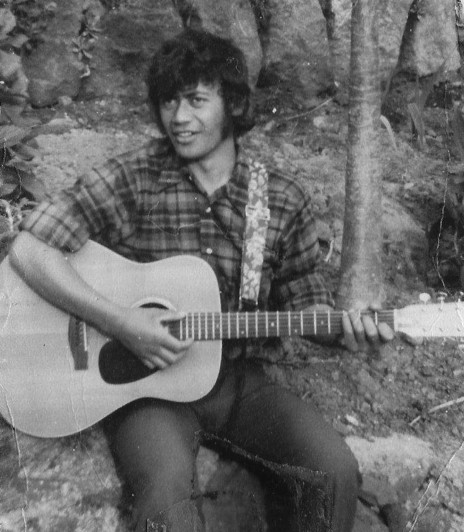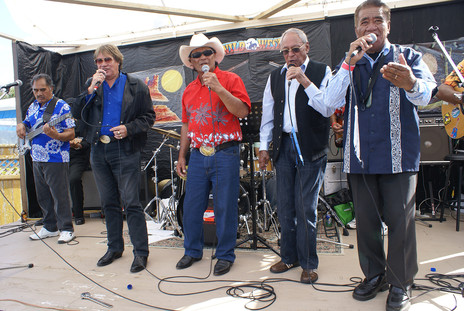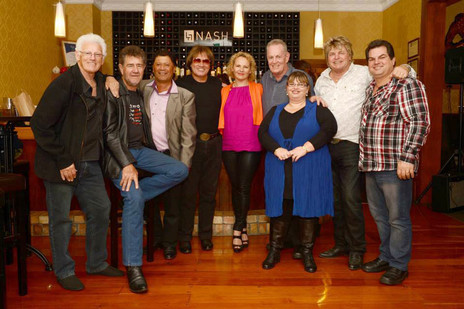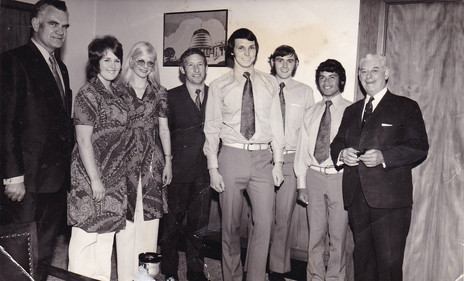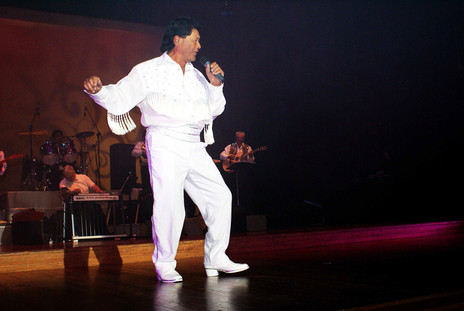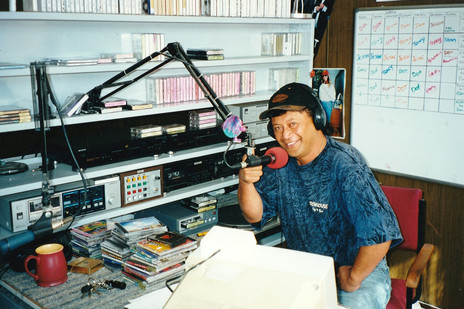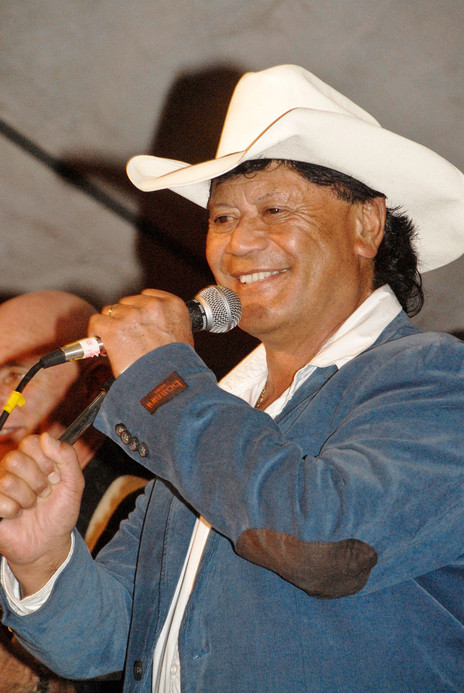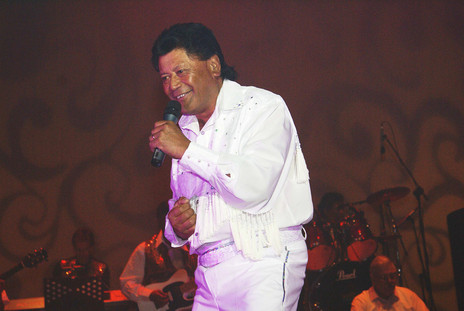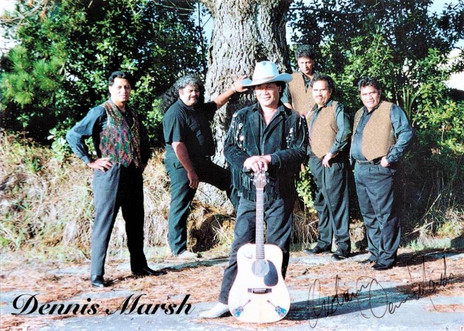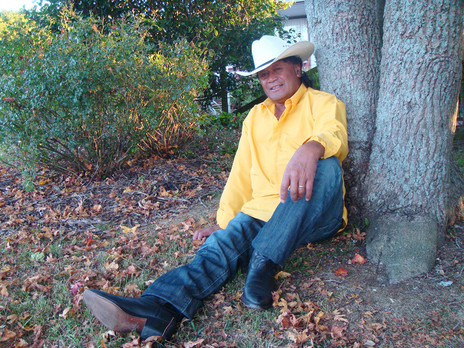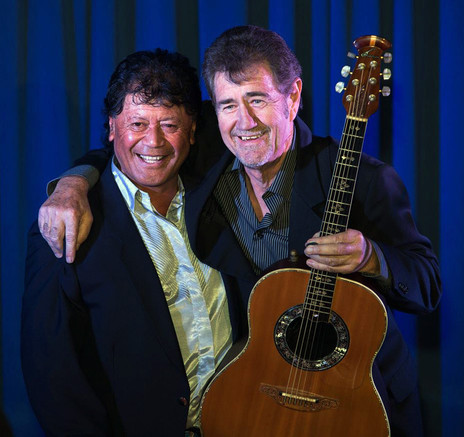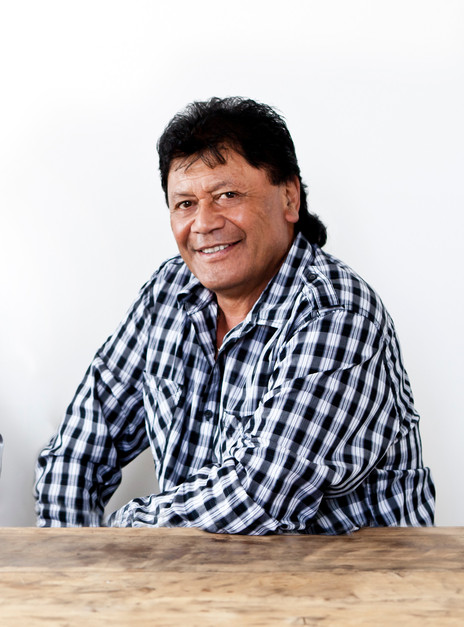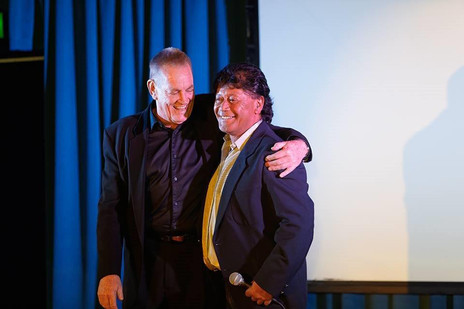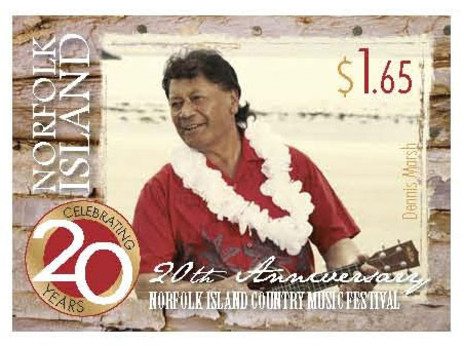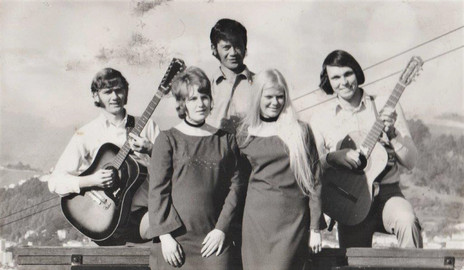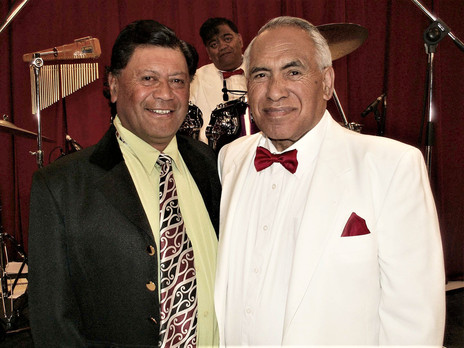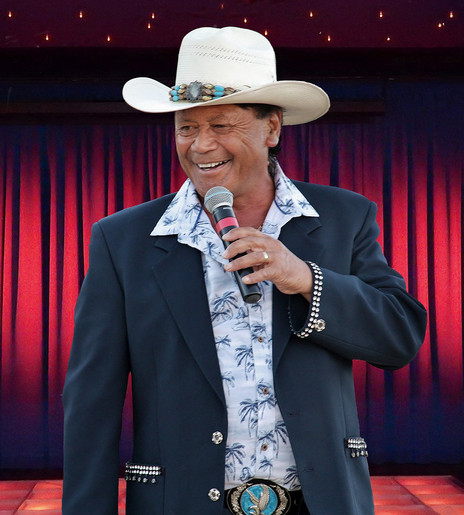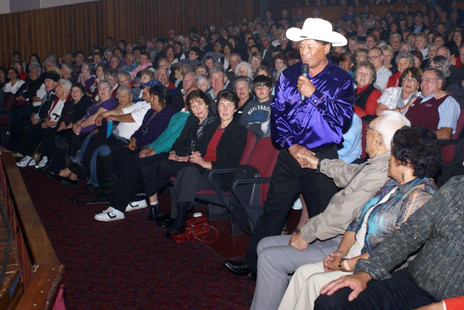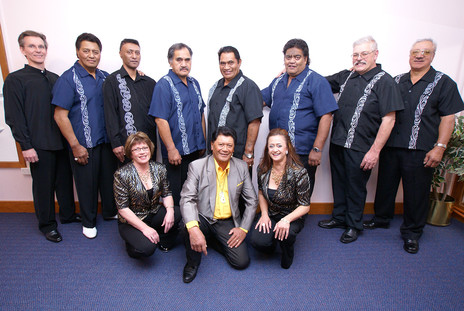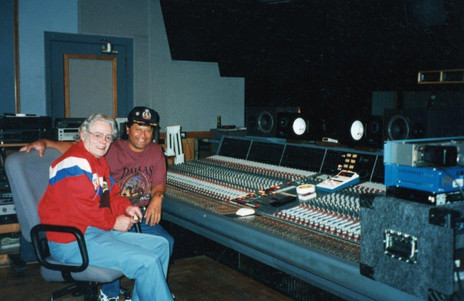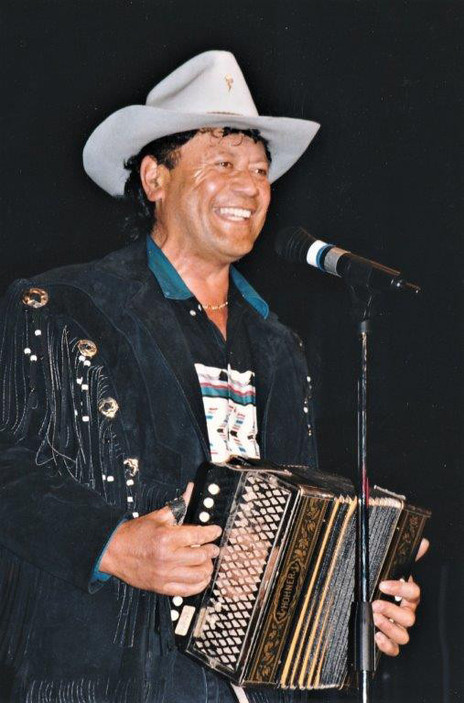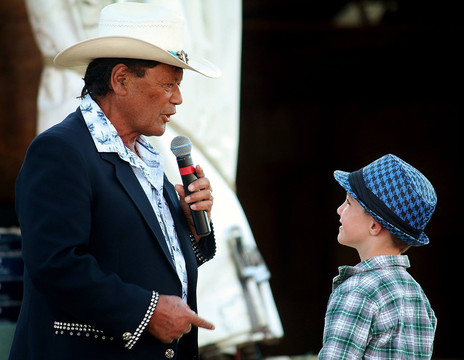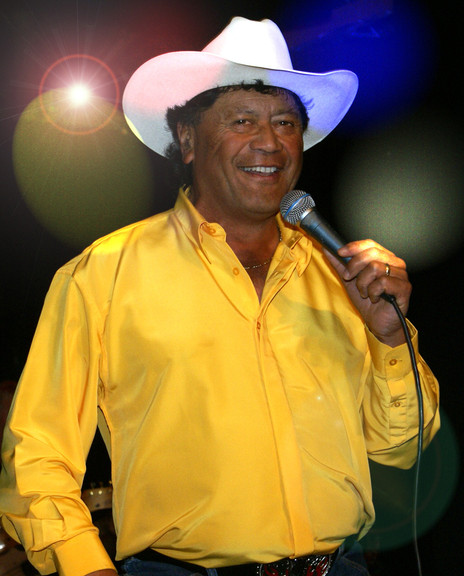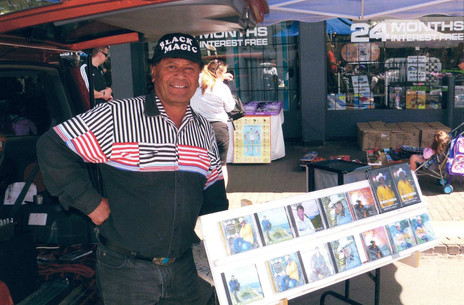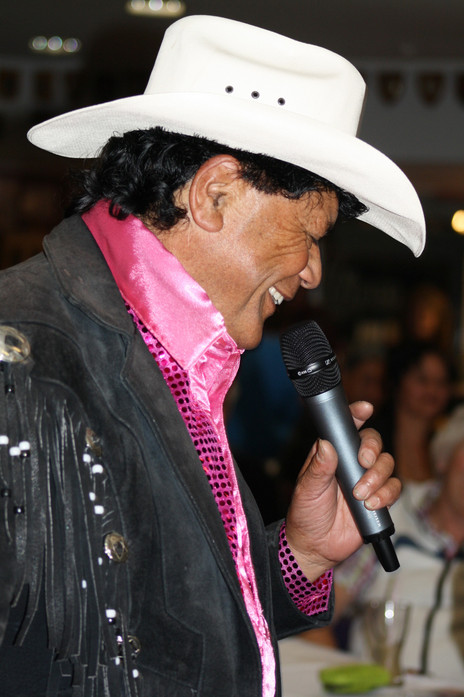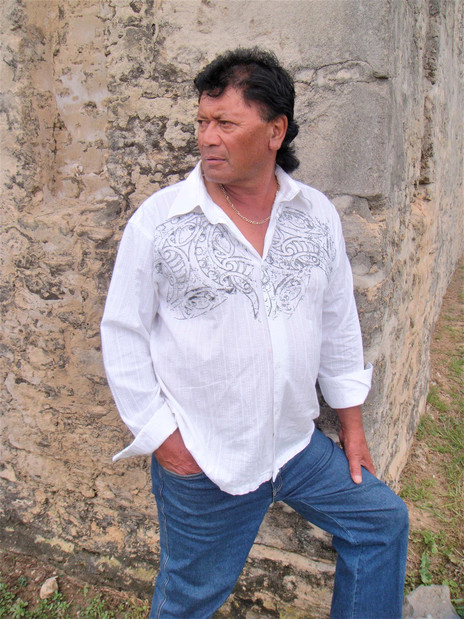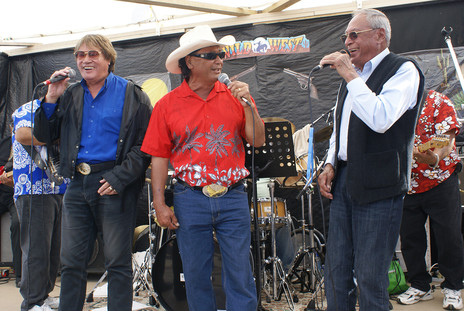That was also the year his Māori Songbook album debuted at No.1 on the New Zealand Top 40 and remained on the charts for 26 weeks, becoming the second top seller across all genres that year, topped only by Six60.
After hosting annual tours to the Norfolk Island Country Music Festival, in 2013 he became the face on the Norfolk Island $1.65 postage stamp commemorating the 20th Anniversary of the festival.
Marsh is a performer of other people’s songs, many with infectious Pacific rhythms or the ‘Ten Guitars’ strum.
Marsh is a performer of other people’s songs, breathing new life into popular radio hits and party songs from down the decades, many with infectious Pacific rhythms, the ‘Ten Guitars’ strum-along and singalongs from past generations.
He has toured the US, Australia and Vietnam and extensively around New Zealand. He’s been on the circuit with Gray Bartlett, John Grenell, Brendan Dugan, Wayne Heath, Eddie Low, Toni Williams, and the Māori Volcanics – and featured on Māori Entertainers Association shows, When the Haka Became Boogie TV show and tour, Highway of Legends and That’s Country tours.
Born under the stars
Dennis Te Uhi Marsh (Maniapoto/Tainui, Te Arawa, Ngāpuhi/Ngāti Hine, Ngāti Tuwharetoa), the third of 10 children, was born under the stars on his grandparents’ veranda in Te Kuiti, on 22 February 1951.
As a youngster he preferred to roam the fields on foot or by horse, often with a fishing rod in hand, exploring the lakes, creeks and rivers of the King Country.
When Marsh went to Auckland to train as an apprentice carpenter-cabinet maker in the late 1960s, like many rural Māori, he stayed at one of the United Māori Mission hostels, where music became part of the social atmosphere. Someone always seemed to have a guitar and a song or two.
The hostel played music over the PA as a wake-up call for the boys heading out to work. Jim Reeves, Elvis Presley and Marty Robbins were first to catch his attention and he also became a fan of Prince Tui Teka.
He socialised through a church rugby team, played volleyball and indoor basketball and, after purchasing his first guitar at the age of 20, discovered he had a good ear for picking up tunes.
“I was only playing three-chord songs, not knowing what I was playing. I’m probably the only muso in the country that doesn’t know music,” he chuckles.
The routine at the hostel was to attend morning and night Sunday services “so we ended up singing gospel songs and hymns”. He and some builder friends formed a quartet and began singing at parties.
On completing his carpentry apprenticeship, Marsh worked for others and then on his own doing up old houses and even buying a few to renovate and on-sell.
Musical minister
From 1976, seeing the positive impact of Christianity on a lot of his friends, he attended the Bible College of New Zealand (now Laidlaw Bible College) in Henderson, and on graduating became assistant youth minister at the Māori Evangelical Fellowship Church.
With about eight others from the hostel, all in their early 20s, Marsh began the biggest youth club in Mangere, “or probably in the country” taking youth off the streets to become part of events at the local college hall and the gymnasium.
In 1979, he was selected from singers around the country to join the Living Bread group representing NZ Youth for Christ to tour to Sydney, the Philippines and Singapore. His first experience in the recording studio came when the group cut an album in Wellington.
his career took a new turn when friends “dragged” him along to the Manurewa Country Music Club.
From 1984 his career took a new turn when friends “dragged” him along to the Manurewa Country Music Club.
“I didn’t really know what country was – I was very naïve about this genre of music but I was pleasantly surprised. I walked in and there were all these Māoris playing in the band – that was the biggest appeal.”
Marsh went back the following week and was asked to get up on stage. He performed Kris Kristofferson’s ‘Help Me Make It Through the Night’ and received an encore. Not having prepared another country song, he sang it again and never looked back.
He became a regular playing drums in the band at the club and over time became more competent on guitar and saxophone.
As a solo artist Marsh initially sang gospel then began learning songs that appealed to older people, receiving invitations to play for senior citizens clubs across Auckland. “They gave me a break and paid me $80 or something like that. I thought that was big money – I still get $80” ... again that warm, hearty laugh.
Getting his music out to a wider market than his live performances was a struggle until he met Terence O’Neill-Joyce of Ode Records, who on being invited to hear him perform, was convinced he had the right stuff and ended up producing and releasing his next 10 albums. Over many years he’s seen the therapeutic power of music on the elderly. “I think that was one of the things that drove me ... I’ve done a lot of out-of-hours shows for people, visited hospitals to sing for them and it’s amazing what music has done.” He says they seem to respond to a voice, a song or memory, often in ways their caregivers have never seen before.
Dennis’s first album in 1989 was a compilation of songs that appeared to have the strongest appeal to his audiences. “Every song I got the biggest clap for, I put a tick beside and included them on For You.”
He began opening for more established acts and finding himself in demand for private parties and even touring to various towns. Having a laugh was always part of the show. “I always felt if I could get people to sing with me, to laugh or cry with me then I’ve done my job as an entertainer.”
Marsh says Māori music has definitely changed over the years with the Bob Marley influence evident all around the country.
He recalls being asked to perform in Ruatoria, a Rastafarian stronghold. “I was a bit apprehensive because I knew they were reggae people. However, when we went down there, the place was jammed with people, all coming to see this young country music singer. I couldn’t believe it!”
They even put a dress code in one of the pubs, so no one could come in with their dirty clothes or Swanndris and boots and wearing knives. “They had to go home and have a shower. It was incredible and everybody enjoyed the whole show.”
Health challenges
Marsh won numerous club talent contests and awards. As he began to venture further afield, he took out the Australasian Gospel Award at Tamworth, Australia in 1988 and in 1989 won the Tauranga Overall Awards which qualified him for the New Zealand Country Music Entertainer of the Year award, which he won.
Although presenting an entertainer’s face on stage, Marsh was struggling with health issues.
Although presenting an entertainer’s face on stage, in the studio and on the building site, behind the scenes Marsh was struggling with health issues.
He was short of breath, had pains in the chest and eventually decided to visit a doctor who had him hospitalised; he was on the operating table within three days undergoing surgery for a heart valve replacement, the first of three.
Marsh was determined this wasn’t going to curb his passion for music or building. Before long he was back in business buying, restoring, redecorating and selling houses and taking entertainment bookings across the length and breadth of the country.
His second album, Your Choice (1990), was a compilation of songs people had recommended for his growing repertoire.
As his popularity on the circuit grew, he formed the first Dennis Marsh Show Band, half of whom had been resident at the country club including Tom Paul on bass, lead guitarist Alf Williams, rhythm guitarist Brian Thompson, drummer Richard Diaz and Robbie Katipa Jnr, “who could play drums, guitar or whatever he wanted to turn his hand to”. The core unit remained with him for decades until the sudden death of Richard Diaz and more recently, Brian (Bro) Thompson.
Complex simplicity
Marsh says people often underestimate country music. “You can try and get guitarists from another genre to play country music and they struggle. Young Robbie Katipa Jr could play any genre whatsoever, the blues, reggae but he could play country licks these other guitarists had never heard before ... just incredible.”
Between 1991 and 1998 Dennis Marsh released five albums with varying degrees of success – Lucky Star, Hobo in a Silk Shirt, Feelings, Dad and Out of Mexico – but the country genre struggled to get airplay.
It was his own marketing efforts that kept priming the pump for CD sales during the first half of his career, as a regular at the Otara, Avondale, Manurewa and Takapuna markets and selling at his concerts.
Even with top Nashville musicians on board, New Zealand Radio Stations denied him airplay.
In the 1990s it seemed to get even tougher for country music. Even Auckland’s pioneering country music radio station was only playing around two percent local content, their dismissive excuse for not playing locally recorded material was, “it’s not up to our standard”.
So Marsh headed for the country music capital of the world, Nashville, Tennessee, to record his eighth album, Out Of Nashville. Even with top Nashville musicians on board and the recording and mixing done by the best in the industry, it still wasn’t enough for New Zealand radio stations.
On one occasion however, their prejudice backfired. “They ran a competition so listeners could vote for their favourite, putting one of my tracks up against Garth Brooks’s ‘Friends in Low Places’. The DJs sure had egg on their faces when my track won ... I thank my fans for that one,” says Marsh.
His Nashville recording did manage runner-up in the best country music album category at the New Zealand Music Awards in 1997.
Marsh laments the fact that even today New Zealand doesn’t have one station that plays country music all day.
While disheartened at the attitude toward his craft, he persisted. His next inspirational album, Faith, had him teaming up with industry greats the Yandall Sisters for backing and harmonies. It was a finalist in the Tui Awards and the New Zealand Music Awards in both the Gospel and Country categories.
In 1998, album number 10, Faded Love, was recorded in a new studio, Manuka Studios, celebrating a new sound.
Hamilton breakthrough
In 1999, a decade after his first album and his first heart operation, Marsh and his wife Yvonne took six months to organise the 10 x 10 Concert at the Founder’s Theatre in Hamilton for what he describes as “the best show” of his career.
The theatre was packed with buses from Kaitaia, Gisborne, Auckland, Te Kuiti and Wellington delivering friends, family and fans for an emotional evening where he received four standing ovations, including one for receiving gold albums for his first two recordings For You and Your Choice.
For his 11th album Terence O’Neill-Joyce suggested he change to a record company that could take him the next stage in his career, so he moved to BMG, where he was “looked after” by Morrie Smith and followed him to Zomba Records, Rajon Music Group (a Division of Sony) and then finally to Sony Records.
Marsh, now feeling more comfortable about his place in the industry, delivered Out of New Zealand in 2000. It was a vindication of his effort, talent and popularity, reaching gold status within three months, and it became his first platinum seller.
On the eve of celebrating the release of his 12th album, Christmas in New Zealand, in 2001 at Auckland’s Sky City Theatre, Dennis experienced a sudden deterioration in his health and it was back to the hospital for a second heart valve operation.
Host with the most
Around this time Radio Waatea asked if he would like to fill in as DJ on the Country Drive Time Show. It was supposed to be for a few days but he ended up staying two years until his performance commitments became too demanding.
He and his band were rehearsing weekly, and more high-end engagements started coming his way, so it seemed the right time to hang up the hammer and concentrate solely on music.
The success of the ‘Out Of New Zealand’ album resulted in a 15-day tour to 14 North Island VENUES in 2003.
There was no keeping him from the recording studio. He delivered To Get To You in 2001 while his 10th album Faded Love was nominated for Best Country Album at the NZ Recording Industry Awards.
The success of the Out Of New Zealand album resulted in a 15-day tour to 14 venues across the North Island in March 2003.
Marsh’s sparkling personality, repartee with an audience and a massive repertoire of songs made him ideal for on-screen work. He had small parts on a couple of TV episodes and had done several TV ads when, in 2006, White Gloves Productions invited Marsh, Ben Tawhiti and friends to film a four-part musical series, Maumahara.
Then in 2013, he became host on Māori TV’s My Country Song for two seasons. The musical showcase series resulted in The Best of My Country Song and a live album, My Country Song – The Showcase Concert, which featured Marsh’s own singing as well as those of the guests he hosted.
Stirring the memories
Marsh says there is always something special about performing before a mainly Māori audience where there’s laughter and everyone singing along because the music means something to them.
“Tui’s not here anymore, Sir Howard’s not here anymore, Billy T’s not here so ... I try to do a little bit from everybody to satisfy them.”
Even though all of his songs are cover versions, Marsh says he doesn’t copy anyone, he’s happy bringing his own style and approach to the songs.
He says country music has a strong following in New Zealand with a lot of younger and up-and-coming artists. “People like to hear a story and know what's happening in a song. It can be a soothing thing.
So, what is it about Māori and about three chords and a good harmony; what is it that makes our spines tingle? “I think you just knocked it on the head, people want to hear good harmony ... it’s easy on the ears,” says Marsh.
“If people like you, you’ve got them for life-long supporters ... they like to hear songs they know, songs they can identify with and sing along to.”
In 2015, to mark the centenary of Gallipoli, he recorded a tribute album for New Zealand’s fallen soldiers, Lest We Forget – which debuted at No.1, reaching gold status within a week.
Just after Anzac Day that year he was back in hospital for his third heart valve operation.
Still doing markets
Based on the success of his favourite album Māori Songbook, “because that’s who I am”, he revisited that formula with Māori Songbook 2, nominated for best Māori album at the New Zealand Music Awards in 2016.
Over 30 years of performing, the biggest change, as expected, is that his audiences have mostly got older but he also has a growing number of young people enjoying his music. “I’ve had 21-year-olds asking me to entertain at their 21st birthday. I thought that’s a bit strange asking for this sort of music but I’ve been there and done that!”
The faith that got him started in music is still there today. His 29th album I Believe, a collection of familiar gospel tracks and pop songs reflects that.
Marsh’s 30th album ‘Backyard Party’ debuted at No.1 in 2018.
He’s not afraid to party either, as his 30th album Backyard Party released in November 2018 shows. The album debuted at the top spot on the local charts, giving him another gold record within a matter of weeks for this canny selection of memory lane hits including ‘Ten Guitars’, ‘Place in the Sun’, ‘Cab Driver’, ‘Lucky Lips’ and ‘My Way’.
Charity work has been a big part of Marsh’s determination to give something back to the community; among the organisations he has worked with are Lions, Rotary, the Heart Foundation, IHC and special needs groups, and those looking after the terminally ill or kids with health issues.
Bringing a little “happiness, motivation” or funding, he says is one of the most rewarding aspects of his career. And the awards keep coming, too. In 2018, Marsh received a recording industry award for over 300,000 album sales and his 20th Album, Backyard Party, debuted at No.1 on the NZ Music Charts (as did his last four albums). At the 2019 Matariki awards, he was honoured for his outstanding contribution to music, receiving the Te Mata o te Ariki special award.
In October 2019 Marsh received the Benny Award from the Variety Artists Club of New Zealand, the highest honour for a NZ entertainer.
In the 2020 New Year Honours, Marsh was appointed a Member of the New Zealand Order of Merit, for services to music and fundraising: “He often performs voluntarily at music festivals and for fundraising activities. He has also supported a large variety of New Zealand charitable organisations, including the Kidney Kids Charity, Pink Ribbon New Zealand, and Opotiki St Johns. All profits from some of his albums and singles were donated to causes such as the Christchurch Earthquake Relief Fund and the Returned Services Association. He regularly performs voluntarily for disadvantaged and disabled youth, as well as the elderly.”
Marsh still calls in to retailers to see how sales are going or to help promote his music. Between gigs, the legendary TV host, concert headliner and recording artist is a regular at the Pukekohe, Manurewa or Pokeno markets, promoting country music and signing copies from his catalogue.
He turns up his backing machine just enough and people are drawn to the music. “I’ve heard people say, ‘I know that voice. I know that voice’. They’ll come round the corner and look at all the albums that I’m carrying. ‘I haven’t got that one ... or that one’. And that’s it, half a dozen albums gone just like that.”
Looking back on his musical life, he says he wouldn’t change a thing. It’s the generosity and loyalty of the people who come to his shows and the friends he’s made along the way that have made it all worthwhile. “It’s just the people really ... they’re incredible.”
